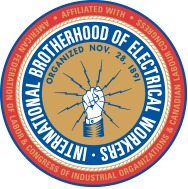Footer
CONTACT INFORMATION
First District (Canada)
1450 Meyerside Drive,
Suite 300, Mississauga,
ON L5T 2N5
Tel: (905) 564-5441
Fax: (905) 564-8114
Email: ivpd_01@ibew.org
1450 Meyerside Drive,
Suite 300, Mississauga,
ON L5T 2N5
Tel: (905) 564-5441
Fax: (905) 564-8114
Email: ivpd_01@ibew.org





